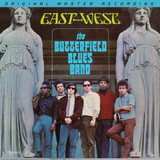The Butterfield Blues Band Blows Open the Doors of Possibility: Recorded at Chess Studios, East-West Sows the Seeds for Acid-Rock and Features Monster Performances from Mike Bloomfield and More
Experience the 1966 Effort in Definitive Sound: Strictly Limited to 2,500 Numbered Copies, Mobile Fidelity’s Hybrid Mono SACD Makes the Album Available in Its Original Mono Mix for the First Time in Nearly 60 Years
The Butterfield Band might be most famous for serving as the backing group for Bob Dylan’s famous electrified show at the Newport Folk Festival, but the collective earned a spot in the Rock and Roll Hall of Fame due to East-West. Though it remains a footnote in many historical narratives, the 1966 record changed the shape of popular music, sowed the seeds for acid-rock, and further demonstrated the visionary abilities and virtuosic skills of a sextet that took the blues in novel directions.
Sourced from the original analog master tapes, strictly limited to 2,500 numbered copies, and housed in a mini-LP-style gatefold package, Mobile Fidelity’s hybrid SACD presents East-West in audiophile sound — and in the original mono mix for the first time in nearly 60 years. East-West was pressed in mono from 1966 to 1968, after which the stereo version (a revised copy of the mono original) became the only option.. Featuring black backgrounds and crystal-clear clarity that expose critical details, dynamics, and tones, this collectible reissue exhibits elevated levels of directness, coherency, and spaciousness. You’ll experience the prized acoustics and dimensions of Chicago’s famous Chess Studios at 2120 S. Michigan Avenue, where the set was recorded.
Playing with superb naturalism, revealing openness, and in-the-room liveliness, Paul Butterfield and Co.’s creations unfurl here with previously unheard imaging, richness, and presence. Every aspect of the album benefits from newfound balance, symmetry, and airiness. Butterfield’s strong lead vocals and signature harmonica; Elvin Bishop’s fusion of gospel, R&B, and country threads; Jerome Arnold’s in-the-pocket bass; Billy Davenport’s bossanova-derived drumming; Mark Naftalin’s illuminating piano and organ; and of course, Bloomfield’s zinging electric guitar. All come across with emotion-triggering realism and responsiveness.
Carrying over most of the same personnel responsible for its stellar eponymous debut, the Butterfield Blues Band made one key change for East-West by inviting drummer Davenport into the fold. His impact on the group’s approaches proved immense. Showcasing refined, delicate, and articulate techniques, and able to underpin the songs with a jazz-driven sense of movement, Davenport allowed the band to improvise. His rhythmic shading, coloring, and control blew open the doors of possibility that other blues ensembles never knew.
East-West also signifies one other important evolution. Spearheaded by its namesake leader, the group became a more democratic outlet in which every member enjoyed meaningful input. Benefitting from such freedom and trust, the instrumentalists turn in peak performances that display the hallmarks of exceptional interplay, chemistry, and communication. Listen to how they glide, sweep, and sway during a melancholic rendition of the traditional blues “I Got a Mind to Give Up Living” and how they swing, skate, and shake on a greasy interpretation of Muddy Waters’ “Two Trains Running.”
Throughout the effort, Bloomfield, Bishop, and friends sock it to ‘em, exploding with energy and raising (and lowering) the temperature at will. The band is equally adept on slow, despondent ballads and husky burners. Pleading and pleading, Bishop takes the vocal lead on “Never Say No,” the closest a song may have ever come to capturing the desperate feeling of a lonely, liquor-soaked 2AM phone call placed to a lover from a bar. On an insistent run through Allen Toussaint’s “Get Out of My Life, Woman,” the group heads in the opposite direction by pairing soulful, New Oreleans-based proto-funk with street-corner grit and Butterfield’s outstanding singing.
And yet the most recognizable signposts of East-West don’t involve any words. Blowing, shuffling, and kicking, the band hints at unexplored landscapes on a sizzling cover of Nat Adderley and Oscar Brown’s “Work Blues.” Its fusion of disciplines and trade-offs between instrumental leads foreshadows experimentation Miles Davis would soon further, while the dialog between Butterfield’s harmonica and Naftalin’s organ makes for spicy conversation.
The album-closing title track escalates the expansiveness and excitement to another level still. Based on Indian scales, John Coltrane’s modal pieces, and a four-beat bass pattern owing to Nick Gravenites’ “It’s About Time,” and arranged as a series of sections given over to various modes and moods, the multi-part composition marks arguably the first instance of such blues-rock improvisation on record — an extended journey rife with raga droning, deep-end jamming, and off-the-wall cross-talk between Bloomfield and Bishop. Heavy, swirling, and occasionally filtered through distorted lenses, it is where acid-rock begins and the Butterfield Blues Band cemented its status as legends.
Many decades later, that east-west journey is still one to be taken again and again.
- Walkin’ Blues
- Get Out of My Life, Woman
- I Got a Mind to Give Up Living
- All These Blues
- Work Song
- Mary, Mary
- Two Trains Running
- Never Say No
- East-West





